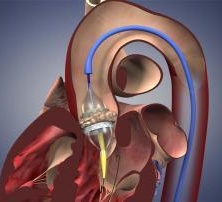Baptist hospital promotes new heart valve treatment
 (CNS): One of the US based hospital that provides care for patients from the Cayman Islands is offering treatment for those with damaged aortic heart valves replaced without traditional surgery with a new FDA-approved procedure. The Baptist Cardiac & Vascular Institute at Baptist Hospital of Miami said that transcatheter aortic valve replacement (TAVR) is a promising treatment in which ‘a team of highly skilled doctors use a minimally invasive approach, gaining access to the heart through a small catheter inserted in the skin, to replace the diseased aortic heart valve while the heart is still beating” which the hospital claims eliminates the need for the heart-lung machine.
(CNS): One of the US based hospital that provides care for patients from the Cayman Islands is offering treatment for those with damaged aortic heart valves replaced without traditional surgery with a new FDA-approved procedure. The Baptist Cardiac & Vascular Institute at Baptist Hospital of Miami said that transcatheter aortic valve replacement (TAVR) is a promising treatment in which ‘a team of highly skilled doctors use a minimally invasive approach, gaining access to the heart through a small catheter inserted in the skin, to replace the diseased aortic heart valve while the heart is still beating” which the hospital claims eliminates the need for the heart-lung machine.
“This is a valuable option for inoperable patients with severe aortic stenosis to improve their quality of life,” said Ramon Quesada, M.D., the Institute’s medical director of interventional cardiology and cardiac research in a release about the new medical service.
Dr. Quesada and Jonathan Roberts, M.D., both interventional cardiologists, Niberto Moreno, M.D., heart surgeon and chief of Baptist Health’s cardiothoracic surgery, Lisardo Garcia-Covarrubias, M.D., cardiothoracic surgeon, and Ralph Machado, M.D., cardiac anesthesiologist comprise the multi-disciplinary team of doctors who perform the procedure.
“Studies show that patients who received the artificial heart valve lived longer, had better heart function and felt better than those patients who did not receive a new valve but were treated medically,” Dr. Moreno said.
During a TAVR, the patient is given general anesthesia while doctors insert a catheter into the femoral artery in the groin and guide it to the heart,” the release stated. An artificial heart valve made of a steel frame and animal tissue is fed into the catheter and threaded to the heart to replace the damaged aortic valve during the two-hour procedure. The frame of the new Edwards SAPIEN transcatheter valve is strong and uses part of the diseased valve to anchor securely in place.
Artic stenosis primarily affects older people with men having higher rates than women, and heart disease is associated with a 50 percent increase in the risk for death from heart attack.
Category: Health

